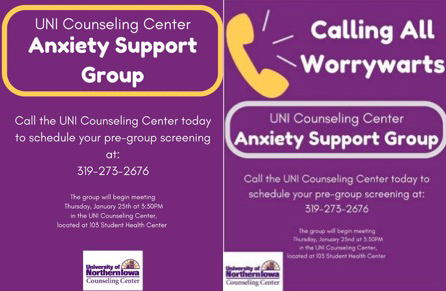Counseling Center sees backlash

In November, the Counseling Center posted an advertisement on social media for an anxiety group that received considerable negative feedback (left). They have since released a revised advertisement (right).
Jan 18, 2018
In November, the Counseling Center advertised an anxiety support group, using the tagline “Calling All Worrywarts.”
They received criticism on social media, including Facebook and Twitter.
However, on Twitter, there was a mixed response, with some students, such as Bailey Rose Baack, being offended. She wrote, “Jesus Christ, this is terrible. Minimalizes actual anxiety. It’s not just ‘worrying,’ guys. For those who say to lighten up— please don’t tell me how to react to messaging that trivializes something I struggle with every day.”
Others took the post lightheartedly. Twitter user Nicole Floyd wrote, “They’ve put a lot of work into the program. I’ve been diagnosed with anxiety and describe myself as a worrywart. Give it a shot before you judge it on the name, guys.”
Shelley O’Connell, Health and Recreation Services Executive Director and Interim Director of the Counseling Center, says the wording was intentional.
“We’re trying to reduce the stigma around mental health, so the wording we used was directly from students that described themselves,” O’Connell said. “We still have to use the word worry.”
This ad is part of a larger outreach campaign from the Counseling Center.
There is a coordinated effort at the Counseling Center to find commonalities between clients, and in turn, address these common issues to better serve the student body. According to Jennifer Schneiderman, a mental health therapist at the Counseling Center, worrying was a major theme last semester.
“Our target audience is people who are worrying,” Schneiderman said. “People use worry and anxiety interchangeably sometimes. The intent of this support group is to call people who are inclined to worry, and to give them strategies and tools to manage their worry.”
O’Connell said that the use of worrywarts is an attempt to reach students who do not necessarily identify with the word anxiety.
“We are trying to find a way for students to understand that is relatable to them,” O’Connell said. “Some students wouldn’t say they have anxiety, but they would say they worry all day long. Everyone worries. Everyone has moments of being anxious, as well. That’s what we’re trying to get people to understand: we have support available for them.”
The Counseling Center has three different support groups this semester: one for anxiety, one for grief and one for Resident Assistants. The support groups involve a pre-screening to assess if a student needs treatment for an anxiety disorder or would benefit from the support group.
Despite the Counseling Center’s intentions, student leaders are disconcerted.
Katelyn Melcher, senior psychology major and NISG’s Lower Cabinet Director of Mental Health, thought the advertisement downplayed the seriousness of anxiety.
“An anxiety disorder is a clinical condition,” Melcher said. “It’s not something to make light of. It can be a crippling impairment for many students, and trivializing the condition only makes it more difficult for students to feel understood and reach out for help.”
McKenzie Dallenbach, a junior psychology and social work major and member of To Write Love on Her Arms, agreed.
“I know a lot of people who don’t want to go because they use terms like that,” Dallenbach said. “I think they could have tried bringing the idea of worrying, but not using the word worrywarts. It’s just as bad as a Nervous Nancy or Debbie Downer, or Clean Freak for OCD. We use them all the time, but they attach a stigma.”
Ironically, Schneiderman said the wording was meant to do just the opposite.
“[Worrywarts] was never to stigmatize or trivialize, but rather to normalize,” Schneiderman said.
Melcher reached out to O’Connell regarding the issue and was disappointed with the response.
O’Connell invited Melcher to discuss the advertisement and come to a better understanding.
“I’m not sure what there was to discuss: people were hurt and felt the Center was out of touch with students’ needs,” Melcher said. “I want to support the counseling center. The licensed staff, the interns and the secretary are wonderful, and I want to make sure to acknowledge that. However, it is difficult to support something that is not willing to own up and apologize for a mistake that could, and very much has, turned students away from their services.”
The Counseling Center changed their advertisement to remove the controversial tagline but did not issue an apology.
Regardless of the intent or change in advertisement, Melcher expected more from O’Connell and the Counseling Center.
“I don’t need an apology,” Melcher said. The student body does.”







